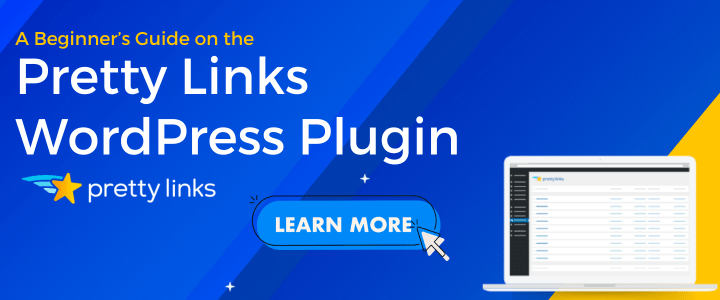Contents
Build a website and the traffic will follow, right? While this is the dream of every website owner, it isn’t likely to come true without major effort. The simple fact is, you need to build credibility and increase your search engine rankings for this to become reality. That can be difficult if your website is brand new.
Fortunately, there are legitimate techniques that will help you bring in traffic and establish you as a credible website. Authority links – those which point back to your site from industry leaders – are your best bet. With these, you can build credibility and climb the ranks on search engine pages.
In this post, we’ll introduce you to authority links and why you need them for your site. We’ll then outline three techniques you can use to build these links to your site, as well as how PrettyLinks’ can help you. Let’s get started!
What Authority Links Are (And Why You Need Them for Your Site)

Authority links are those posted on a respected site that point back to your own. They can be links to your blog posts, resource pages, and more. These link backs are crucial, especially if your website is new. They can help you ‘climb the ranks’ and become an industry leader. Here’s how:
- They help to establish you as a credible website within your industry.
- You can expand your reach, which naturally brings more targeted traffic to your website.
- They can increase your ranking on Search Engine Results Pages (SERPs).
One link from an authority site can be worth more than multiple links from subpar sites. You must build your authority links with discretion, as links from lower-quality sites can actually harm your ranking and credibility.
How to Build Authority Links to Your New Website
Finding the right places to build authoritative backlinks can be tricky. However, with the tips below, you’ll be off to a solid start.
1. Guest Post on Industry Blogs

A guest post is a contribution to another website or blog. It helps to build authority links to your website, and add credibility to your expertise. Of course, pitching your guest post ideas is important. Here are two tips you’ll need to keep in mind:
- Be sure the website allows dofollow links. These links ensure search engine bots pass link juice to your website.
- Link to a landing page. This can improve the odds of reader conversion.
Now it’s up to you to make the most of this opportunity. These tips will get you started, but there are many more you can implement for a successful guest posting experience.
2. Collaborate with Industry Leaders

Working with industry leaders will build links, as a collaboration typically includes links to all collaborators’ websites. While reaching out to industry leaders can be daunting, it’s the best way to find collaboration opportunities. You can also:
- Find already-created content. Reach out to bloggers with roundup posts and see if they’d like to update their post with new quotes/insights.
- Create your own. Email industry leaders to see if they’d like to trade guest posts with you, or ask for them to participate in a roundup post (which they’ll surely link to themselves).
Most importantly, you need to be sure to offer new value to the industry leader’s audience. To learn more about the audience, browse the blog’s posts, reader comments, and other interactions.
3. Create Free, Valuable Resources for Your Industry

A resource is content that’s helpful to industry readers. By creating your own resource that meets the audience’s needs, you may be able to earn a backlink from popular industry sites. Creating resources isn’t the hard part; finding opportunities to pitch them can be. Here are two tips to get you started:
- Find bloggers with resource pages. If an industry blogger has an updated resource page on their website, send them an email asking them to include you on the page.
- Link to it yourself. Link to it within guest posts, on industry forums, and even on social media.
Content is a powerful tool, and it can help you to build authority links directly back to your website. As a bonus, it can also enable you to offer value to your readers.
How Shortening Links (With PrettyLinks) Can Improve Your Link Building

PrettyLinks is a link management plugin with a variety of helpful features (including link shortening). Aside from the aesthetic appeal of shortened links, they also provide marketing benefits. For example, you can create audience-targeted slugs for your links on authority sites.
With the plugin installed on your WordPress site, you can create shortened links in minutes. To get started, go to the left side of your WordPress dashboard, and select PrettyLinks > Add New Link. Select your preferred Redirection type and Target URL:

You can now create your custom slug (this appears at the very end of the shortened URL), and you even have a slew of Advanced and Pro Options to choose from. One such feature is link tracking (Advanced Options > Tracking), which enables you to see how your links perform.
Conclusion
Building authority links to your website can establish it as a credible and valuable resource. In addition, it can boost your SERP rankings and ensure you have a steady flow of targeted, quality traffic.
In this post, we’ve introduced you to authority links and their worth. We’ve also shown you three ways to build authority links to your site. To quickly recap:
- Guest post on industry blogs.
- Collaborate with industry leaders.
- Create free, valuable resources for your industry.
Do you have any questions about authority links, or how they can be used for your new website? Let us know in the comments section below!








Leave a Reply